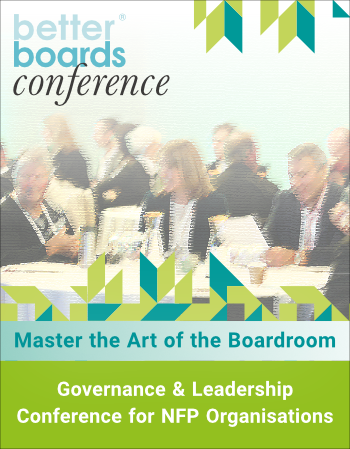governance
Reviewing Your Constitution – Food for Thought
Published: September 8, 2014
Read Time: 5 minutes

Your constitution (or sometimes referred to as your governing rules or charter) is the document that governs how your Not-for-Profit (NFP) organisation operates. It is a legal document — a contract — and its terms must be complied with at all times.
Importance of your constitution
Your constitution must comply with the laws that are relevant to your NFP organisation which may be the Corporations Act 2001 (Cth), or the Associations Incorporation Act of your State or Territory. If your organisation is a charity, your constitution will also need to comply with the Australian Charities and Not-for-Profit Commission (ACNC) Act 2012 and the associated Governance Standards, effective as from 1 July, 2013.
Review your constitution regularly
As part of good governance, you should review your constitution from time to time to ensure that it reflects your current objects, activities and operations, and so that it does not risk any tax endorsements or concessions that your NFP may currently enjoy. It is also important to ensure that your processes continue to be workable and sufficiently flexible to meet your practical needs.
We generally suggest a constitutional review every two to three years, but if your organisation is a charity, you may wish to review your constitution sooner, to ensure that it complies with the recent changes introduced by the ACNC.
What you should focus on
A constitution can be overwhelming. We provide you with some food for thought by setting out below three key areas that are most susceptible to variation, highlighting several areas which we consider you should focus on during any review.
1. Objects
Your constitution must correctly reflect your organisation. In the ever-changing NFP sector, it is common for organisations to depart from their originally determined path, meaning their current objects and activities may be out of sync with those stated in their constitutions.
Considerations
Do the objects in your constitution:
- Reflect what your organisation is actually doing? It is a good idea to also check the objects against what your website represents that your organisation does.
- Reflect the purpose of your organisation?
- Satisfy the criteria to enable the organisation to be eligible for appropriate tax endorsements and concessions? Do you need to consider ATO criteria or ACNC criteria and the new definition of charity from 1 January 2014?
- Allow your organisation to develop and do the activities it wishes to do in the future?
2. Board/committee
There are many structures your board/committee can adopt. Is the structure you currently have working for you?
Considerations
- Is the procedure stated in the constitution for appointing/electing board/committee members still being applied, or do you need to change it to reflect what is actually happening in practice?
- Are you satisfied with the size of the board/committee?
- What about the term of the board/committee members? Do you have a good rotation policy so that you have a mix of experienced board/committee members and new blood on your board/committee?
- Are directors/committee members required to be members of the organisation? If so, will those members be able to bring the range of perspectives necessary to ensure robust decision making?
- Does the constitution set out the office bearers that you wish to have on your board/committee? Are the provisions regarding their election/appointment and term clear? Is the statutory role of secretary/public officer appointed in accordance with the legislation that applies to your NFP?
- How are vacancies dealt with in the constitution? Does the procedure work in practice?
- The procedural aspects of convening board/committee meetings should be reviewed, for example, what is the required notice period, and would this allow directors/committee members to meet their care and diligence obligations in all circumstances?
- Are you paying your directors/committee members? Is your constitution clear about what exactly they can be remunerated for?
- Do you have alternate directors? This is a governance issue. If you do wish to allow directors to appoint an alternate director in the event that they will not be able to attend board meetings for an extended period of time, do you require the appointment of such alternate directors to be approved by the board beforehand?
- Does your board/committee have the power to co-opt directors? Most NFPs these days are moving toward this so that the board is able to meet any skill shortage it may have.
3. Members
Does your membership structure work for you?
Considerations:
- Are the eligibility criteria for membership and/or classes of membership appropriate? Should you streamline the classes or introduce more classes with potential financial benefits? Do the eligibility criteria for membership contravene the Competition and Consumer Act 2010 (Cth), and do any of the Objects risk contravening the same Act?
- Do you have or need corporate members? If you have corporate members, is there a “Representative” clause in the constitution?
- Does the membership application procedure work for you? Are potential members nominated and seconded, thereby giving greater control to the members?
- When was the last time you reviewed your membership fee rules? Are members being charged too much or not enough? Does the power to set fees reside with the directors/committee members who have a fiduciary duty, or with the members who have no fiduciary duty?
- Does your organisation follow the dispute resolution procedure as set out in the constitution, or do you need to amend it so that it works for you in a practical sense, while still complying with the principles of natural justice?
- Generally speaking, are your members clear about what they are permitted to do under the constitution? You may find it useful to explain to members that they may, for example, vote at annual general meetings and may call special general meetings.
This article was originally published in the Better Boards Conference Magazine.
Share this Article
Recommended Reading
Recommended Viewing
Author
-
Partner
Mills Oakley
- About
-
At the time of writing, Vera heads up the Sydney Not-for-Profit, Human Rights & Social Impact team at Mills Oakley. Acting for numerous charities, religious and not-for-profit organisations, Vera has 30 years’ experience in the legal profession.
In her work, Vera is well recognised for her expertise in assisting clients with governance and fundraising issues, restructuring and mergers and regularly advises on constitutions and ACNC/ATO endorsements. Vera has written several academic works, including a chapter within ‘Charity Law’ (2012, 2016 and 2018) published by Thompson Reuters.
Vera sits on numerous charity boards, associations and committees including the ACNC Professional User Group, the Community and Consumer Consultative Group, Cemeteries and Crematoria NSW, Everyday Justice and CatholicCare, Diocese of Parramatta.
Found this article useful or informative?
Join 5,000+ not-for-profit & for-purpose directors receiving the latest insights on governance and leadership.
Receive a free e-book on improving your board decisions when you subscribe.
Unsubscribe anytime. We care about your privacy - read our Privacy Policy .







